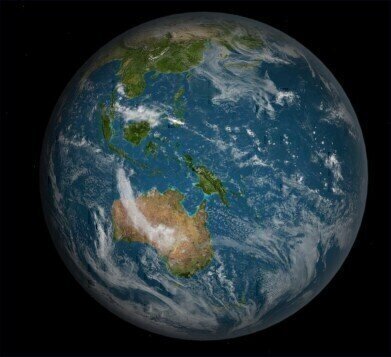News
What Would Happen if Everyone in the World Jumped?
Apr 23 2015
Back in 2006, an internet user calling himself Professor Hans Peter Nieward, from the Munich Institute for Gravitational Physics, claimed to have a coordinated a synchronised mass “jump” of more than 600 million people. The event, known as World Jump Day, was intended to use the collective mass and force of the 600 million participants to alter the Earth’s rotational axis.
Eventually, it was revealed that the site was a hoax and the Professor was unmasked as German artist Torsten Lauschman, who orchestrated the scheme as an elaborate art installation. However, Lauschan raised an interesting question: what if everyone in the world jumped at once?
Problems of Mass Distribution
There are approximately seven billion people on Earth, with a combined estimated weight of around 363 billion kg. Such an immense weight could surely have an impact on the Earth’s rotation, right? Well, no. These seven billion people are distributed all over the planet’s surface, meaning that a simultaneous jump would effectively “cancel” each other out.
What if we were somehow able to get everyone in one place? According to Michael Stevens from vSauce, if we actually assembled every single person on the planet and got them to stand side by side, we could all fit into the city of Los Angeles in California. This is, in itself, pretty amazing… and it would also surely help with the coordination.
A More Concerted Effort
So, would relocating to the same spot help? Well, the good news is that we would be able to move the Earth. The bad? That such a move would be infinitesimally small… and that right afterwards, both us and the Earth would move right back to where we had been to begin with.
Rhett Allain, a scientist at the University of Southeastern Louisiana and a contributor to blog site Dot Physics, decided to test out this theory once and for all (and he even showed us his working – extra points). Allain calculated that even if we were all gathered in the same spot, we would only succeed in moving the Earth at a rate of 2.6x10-13m/s. To put it somewhat simpler, we would only move the Earth the distance of 100th of the radius of a single hydrogen atom. Sheesh.
It’s All Relative
Why would we have such an insignificant impact on the Earth’s trajectory? Well, Isaac Newton taught us that for every action, there is an equal and opposite reaction. However, this reaction is also relative – in this instance, relative specifically to mass. While our combined total weight is pretty impressive (363 billion kg), it is dwarfed by that of the Earth (6 x 1024 kg). As such, though we are giving the Earth just as good as we get, we make very little difference to it.
Although the results may be a little disheartening about the impact we as a race hold, the experiment is an interesting illustration of what science can teach us. Recently, a similar mystery with a much more encouraging outcome was solved by scientists from Stanford University. To read more about this myth-busting investigation, read the article The Riddle of the Bird in the Cage is Finally Put to Bed.
Digital Edition
Lab Asia Dec 2025
December 2025
Chromatography Articles- Cutting-edge sample preparation tools help laboratories to stay ahead of the curveMass Spectrometry & Spectroscopy Articles- Unlocking the complexity of metabolomics: Pushi...
View all digital editions
Events
Jan 21 2026 Tokyo, Japan
Jan 28 2026 Tokyo, Japan
Jan 29 2026 New Delhi, India
Feb 07 2026 Boston, MA, USA
Asia Pharma Expo/Asia Lab Expo
Feb 12 2026 Dhaka, Bangladesh



















